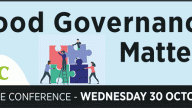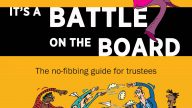Are Boards changing with the times?
It's been 4 years since we published It's a Battle on the Board. So, has anything changed in that time?
It’s now been 4 years since I submitted my draft of It’s a Battle on the Board – my book about how boards can be super effective in their governance. It’s consistently been a best seller on our lists ever since publication and often charities have bought copies for every member of their board.
So, four years on do I think anything has changed? Well, it’s a tough one because I still spend quite a bit of time talking to CEOs and Chairs who are dealing with stickly challenges within their boards and between their boards and Executive Teams – and it is not unusual for these to end at best with a parting of ways and at worst acrimoniously (although they usually haven’t read my book if this happens!).
I have definitely seen an increase in the number of boards who are no longer complacent about how they operate. It seems to me that trustees are becoming more aware of how important trusteeship is and are being more enquiring and more engaged.
I have noticed a sea change in quite a few charities where boards are communicated with regularly outside of the main board meeting and understand that engagement is not about attendance.
Turning up to a board meeting doesn’t mean you’re engaged – responding to requests for help, replying to email communications, getting in touch with the Executive Team out with a meeting when you have an idea or a piece of useful intelligence that will help the charity move forward – this is what engagement is.
When governance goes wrong I’ve observed it’s usually for one of these reasons:
- The board as a whole is not fully engaged with the work of the charity and don’t pay attention to what is going on, especially if they’re unable to attend a board meeting for whatever reason
- They misunderstand the role of the Chair and think that the Chair is the boss of both the board and the CEO and so abrogate their collective responsibility
- They forget that they are all equally accountable for the work of the charity and the CEO reports to all of them. The role of the Chair is to facilitate the relationship between the CEO and the board, so it’s important that boards stay engaged in this relationship
- They misinterpret their role as governors of the charity and think that they should be dictating the work
Amy Briaer, CEO of the Pears Foundation and Chair of the Miscarriage Association says that the board has three jobs: oversight, insight and foresight. I think that is a brilliant summary of the role.
But it’s a tough job – so come and hang out with other trustees and Execs at our Governance Conference and gain some new skills, some new insights and new enthusiasm for the role!
Work on your governance skills at our upcoming Good Governance Matters conference, learn more here.


